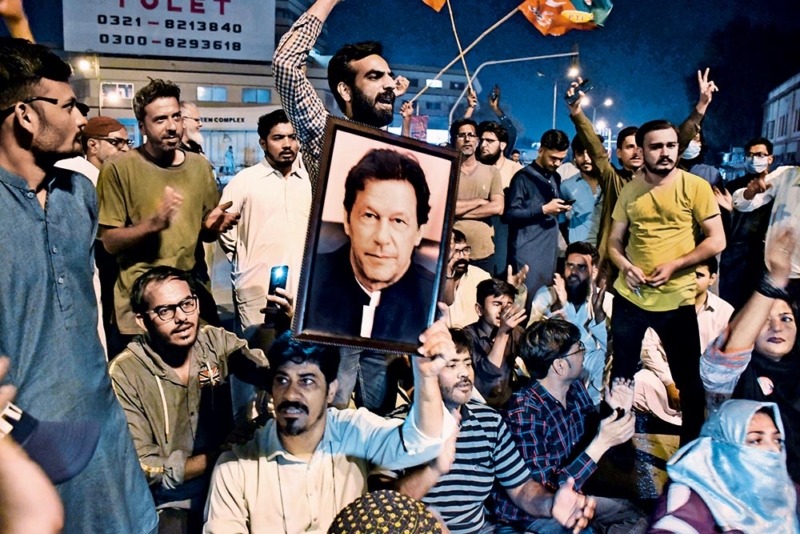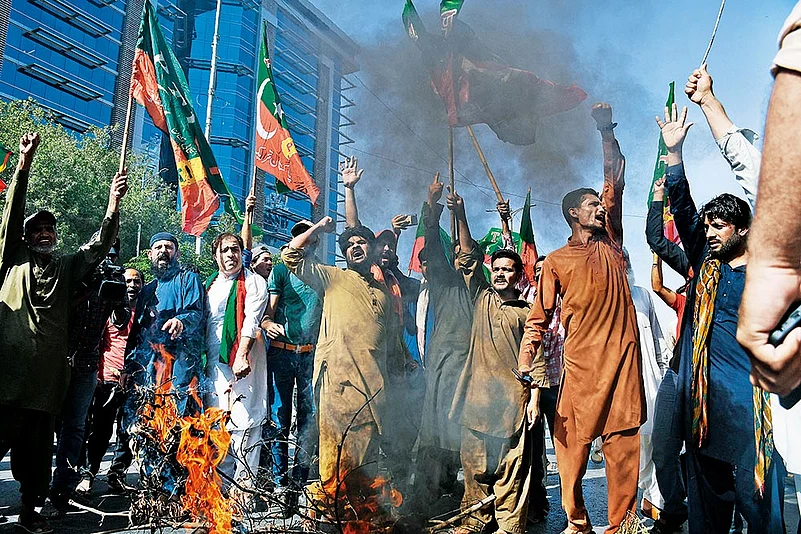Following the tumultuous events in Bangladesh and the dramatic ouster of Sheikh Hasina, Pakistani analysts have been debating if such a regime change was likely in their country. At the outset, the conditions could not have been more favourable for a people’s movement—a popular politician behind bars, his support base angry with the powerful military establishment and worsening economic conditions, especially inflation. Yet, the emerging consensus is that a Bangladesh-style uprising was unlikely—at least for now.
For more than two years, the political landscape of Pakistan has been defined by the ongoing tussle between former Prime Minister Imran Khan, his party Pakistan Tehreek-e-Insaf (PTI) and the military-intelligence complex that has traditionally directed political change in the country.
Despite the odds stacked against Khan, his party performed rather well in the February 2024 General Election. It was clear that voters were defying the junta and its decision to keep Khan out of power. The PTI emerged as the single largest party in Parliament, and this was a dramatic victory as many of its candidates’ faced obstacles, there were reports of manipulation of election results, and the party was not even allotted its symbol (that is vital for less literate voters).
But as the power game plays out in Pakistan, a coalition was forged by Sharif-led Muslim League and the PPP with the blessings (some say active involvement) of the military establishment. For the past six months, they have been struggling to govern with a widespread perception that the regime lacks legitimacy. In fact, the traditional classes that have supported such dispensations—the middle-class professionals, business groups, and retired servicemen to name a few—have been openly criticising the Army and its role in politics.
The real challenge for the current government, and by extension the military junta, is the economic hardship that is affecting almost every Pakistani.
The domestic turmoil has been accentuated by the mayhem in the peripheries of the country. The northwestern regions are afflicted with the return of the Pakistani Taliban and their continued attacks on security agencies and brazen extortion activities. In the country’s south, Baloch activists have been protesting for weeks against their marginalisation in their own homeland and for the return of missing persons. There have been sectarian clashes in another tribal district in the north and even the Pakistan administered Azad Jammu and Kashmir has seen rioting over food prices and other grievances.
What is missing amid all this mayhem is organised protest in Punjab, the most populous province, that determines the power matrix. The current regime has been extraordinarily vigilant and repressive when it comes to any effort of public mobilisation by the PTI. This is why public anger has not found a venue. Furthermore, Khan’s incarceration has left the party in a state of disarray with multiple groups and individuals vying for power. Reports have emerged that intelligence agencies may be creating further divisions in the party. All of this, however, has no impact on Khan’s popularity and not unlike the South Asian formula, jail time is a popularity booster as public sympathies grow.
Economic Meltdown
The real challenge for the current government, and by extension the military junta, is the economic hardship that is affecting almost every Pakistani. Recent increase in energy prices, and high taxation rates (even on meagre salaries) have been extremely unpopular and with another set of IMF conditions on the anvil, popular uprisings cannot be ruled out. Just a few days ago, Nawaz Sharif (whose brother is the prime minister and daughter, the chief minister of the Punjab province) announced subsidies for low to middle-income electricity users but that may not be enough.
Pakistan’s economic growth is likely to remain low (between 2 per cent and 3 per cent) and in recent years, any gain in income has been offset by high inflation. Poverty has increased leaving at least 20 million people poorer than before. Youth unemployment remains high as domestic and foreign investment have shrunk. The country was dependent on western aid that is also not forthcoming, and the elites continue to enjoy their perks, exemptions such as tax breaks and rebates, and subsidies to the tune of $17 billion as per a 2021 United Nations (UN) report.
Nevertheless, a Sri Lankan-type default is unlikely as the IMF staff have committed to another programme (the board will review it soon). A Bangladesh-type protest requires a measure of grassroots structures. Mainstream political parties in Pakistan, over time, have abandoned building their local networks and almost all of them have badly-organised cadres.
The only organised forces are the right-wing Islamists of different hues and in the event the country experiences wide protests, the Islamists will be at the forefront. The Jamaat-e-Islami has been mobilising its support base against inflation in recent weeks, albeit in limited geographical locations. Unlike Bangladesh, Pakistan is a heterogenous country with diverse ethnicities and regional groups and bringing them under a ‘national’ umbrella is challenging to say the least.
Yet, the economic squeeze is a real threat, and popular movements often entail unexpected, and sometimes small, events that spark a larger fire. Commentators have suggested that the pre-Arab Spring conditions—disconnect between the state and the citizenry, economic woes, social media, and repressive political environment—exist in Pakistan.
The incumbent government will have to make concessions, cut wasteful spending, and suspend large-scale, long-gestating projects if it wants to give relief to the people. The voters and their choices need to be respected through a fair and transparent election. What is urgently needed is a redrawing of governance led by the political elites with a clear message to the military to return to the barracks. This must be accompanied by freeing political prisoners, including Khan. Sadly, he has been averse to talking to other political parties as he insists that he will only deal with the military.
What history tells us is that civilian supremacy can only be achieved through alliances across political and civil societies; and checking the power of unelected institutions such as the Army and the judiciary.
(Views expressed are personal)
Raza Ahmad Rumi is a Pakistani policy analyst and journalist
(This appeared in the print as ‘No Country for Rebellion’)
First published in Outlook India




